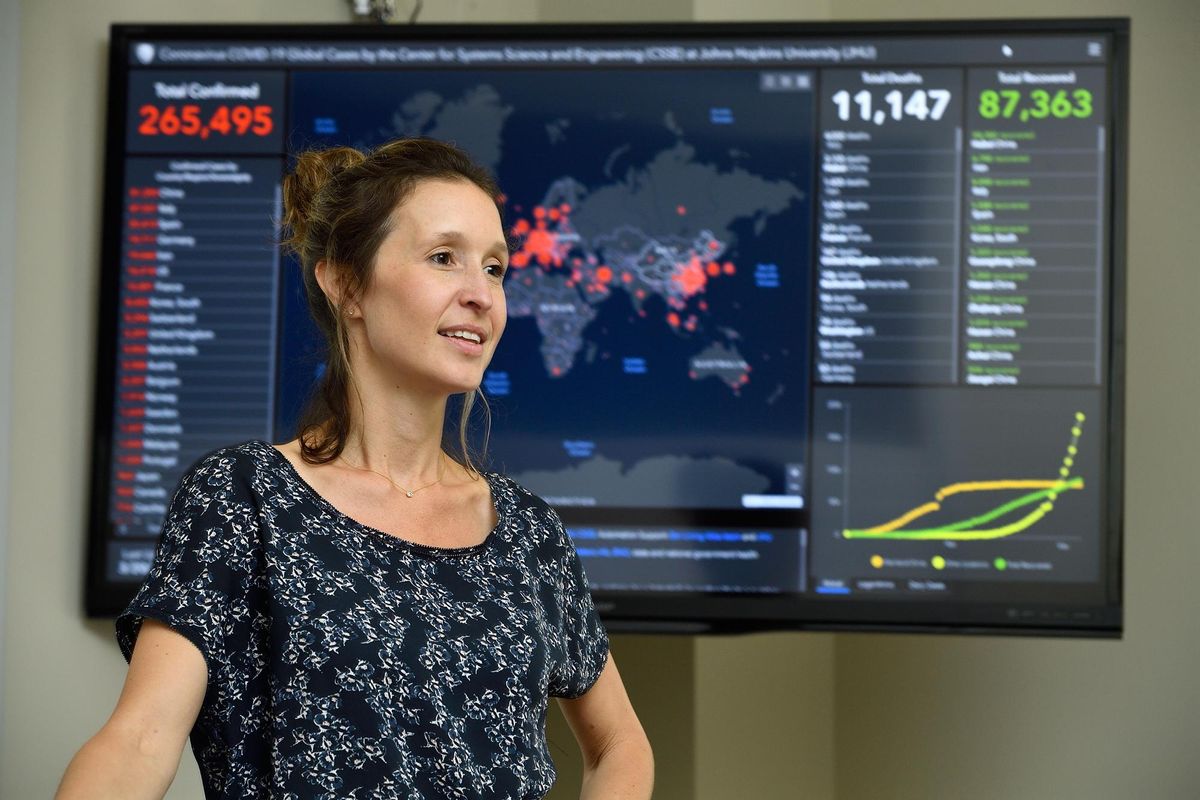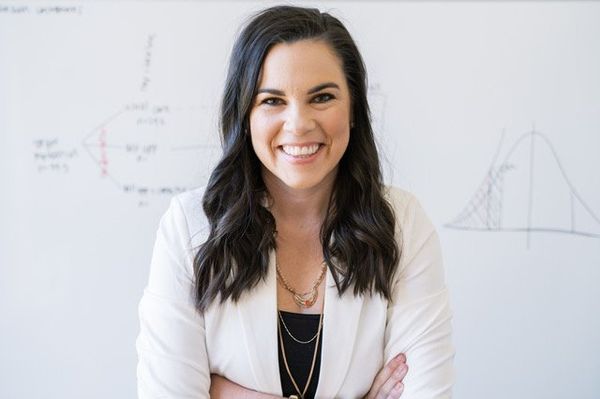In January 2020, Lauren Gardner, Ph.D., associate professor in the Department of Civil and Systems Engineering at Johns Hopkins University in Baltimore, Maryland, watched the Covid-19 pandemic start coming to light.
Literally overnight, she and her team created the Johns Hopkins Covid-19 dashboard — yes, that dashboard — to track the pandemic. She had no idea the popularity of the dashboard would spread almost as rapidly as the virus, getting over 4 billion hits as the pandemic surged in April. By that time, Gardner was one month pregnant with her first child. She's just returning from maternity leave and was gracious enough to take some time to speak with HealthyWomen's editor-in-chief Jaimie Seaton about the dashboard, which earned her a spot as one of Time magazine's 100 most influential people of 2020.
The transcript has been lightly edited for clarity and length.
HealthyWomen: The dashboard debuted on January 22, 2020. Can you tell me the impetus behind its development and design?
Dr. Gardner: The 22nd was actually the day after the first Covid-19 case was reported in the U.S. I'm not normally a data collector, I'm usually a data user. And my research expertise is in modeling infectious disease risk, and in particular, emerging infectious diseases and novel pathogens.
I know that this is a very data-poor field, and to really understand these risks, especially at their emerging stages, you need data in real time that's representing what's going on. So we were keeping an eye on this when there were just a few hundred cases in China, and we were collecting data on it and decided to start building out this dynamic daily data set and make it publicly available for anyone else that wanted to use it, which I thought would be my small modeling community.
And then we made the map to go alongside the data to visualize it as the outbreak was growing. The motivation for the dashboard was collecting and sharing data. We had no idea at the time that it was going to be collecting data on something that would pretty much impact everyone's lives on the planet.
Of course, in hindsight it's understandable that information about this kind of circumstance would be something of interest to the general public. There are emerging infectious diseases that are introduced in different parts of the world all the time that don't catch the world's attention, and we had no way of knowing in the earliest days how this would evolve out of China and how widespread it would be and how impactful it would be.
HealthyWomen: How long did it take you to design the dashboard?
Dr. Gardner: For as popular as it is now, I think it's hard to believe that we built the prototype for it in one night. We had a lab meeting on the 21st and were talking about all the other things we were doing on measles and dengue and all sorts of other diseases and started discussing Covid-19. Literally that evening, after we decided to start sharing this data, we also decided to build the dashboard and debut it the next day. And by debut, I just mean I shared a link on Twitter.

(Gardner and her team. Photo/Will Kirk)
HealthyWomen: How many people do you have on your team?
Dr. Gardner: Well, that has varied over time because the dashboard evolution has changed a lot. When we started this, there were two of us, and it was just two or three of us for a while. And then it blew up really fast, and at times there were a couple of dozen people on it. But there's a core team of maybe eight to 10 people that have been on it pretty much from March of last year, so it's pretty small.
HealthyWomen: Where does the data come from and how are you able to collect it so quickly so that the dashboard changes in real time?
Dr. Gardner: That's changed over time as well because when we started this, there wasn't a Covid-dedicated website or public health department website. We have been able to do it by just having an amazingly talented and dedicated group of software developers and researchers that are consistently seeking out these authoritative sources for data and validating them, and then integrating the data into our pipeline and all the other pieces that go along with that.
HealthyWomen: So initially, before governments had these websites, was your team manually going online gathering data?
Dr. Gardner: We were absolutely doing it manually because there was no other option.
HealthyWomen: You mentioned that in the meeting on the 21st, you were also looking at dengue fever and some other outbreaks around the world. So has there ever been a tool of this kind before that's used by so many people or that's tracking a disease in real time this way?
Dr. Gardner: There are definitely other websites and groups dedicated to collecting information in real time on infectious diseases as they're reported, but I don't think any has ever been used to the same scale as ours. One reason is because there's never been, in 100 years or in this current time with the internet, another disease that has impacted so many people where there would be so much reason for people to use that tool.
And the other reason is, we are providing data in a new way in that it's very accessible and very actionable. Our data is made available to everyone, from researchers to the general public, that wants to dig into it and look at it and use it in models at a scale that they can actually learn something and do something with. At the same time, we were providing a really intuitive visualization of it, which is I think what made it popular with the general public.

(Photo/Will Kirk)
HealthyWomen: That's the perfect segue to my next question: Were you surprised at how quickly the dashboard became the de facto source for the world and became so popular?
Dr. Gardner: We did this for my little research community and definitely weren't expecting that this would become something that was so adopted by the general public. I also didn't really think at the time that it was the role of a small research group to be collecting data on a global pandemic and providing it to policymakers around the world. I think of other larger organizations as being responsible for those kinds of things, but that wasn't happening in the earliest days. I knew it was a gap that existed for the general public knowledge as well. And We were definitely surprised and not expecting it to be on CNN within a couple of weeks.
HealthyWomen: Why do you think that people gravitate toward the dashboard?
Dr. Gardner: I really think it's because the information is provided in a very simple and intuitive visualization, so anyone can access it really easily by just getting on the internet, and then immediately see what's going on without having to do much more.
Also, it was from such an objective, unbiased and trustworthy source coming from John Hopkins University; it wasn't in medicine, it was actually out of engineering, which I also think is great. But the fact that it was coming from the university and there were science and facts driving it, I think that made a lot of people rely on it.
HealthyWomen: Is the dashboard currently being run remotely by people at home?
Dr. Gardner: Up until about April, we were still working together on campus, but we have pretty much been remote since.
HealthyWomen: So while the rest of the world is juggling their work and their kids and everything else at home, all of you who are doing the dashboard are doing the same thing?
Dr. Gardner: Pretty much. I was pregnant through all of 2020 and had a baby in the middle of December, so that was definitely interesting.
Everyone was working from home remote. We were on meetings every day, working on this for hours, and then half of the people, maybe, were also balancing childcare. And being pregnant was one thing, I was extra tired, but my colleagues and everyone around the world that dealt with being a parent while working remote through Covid are basically superheroes in my book.
HealthyWomen: What was it like leading the dashboard team through your pregnancy?
Dr. Gardner: It was exhausting for multiple reasons, as you can imagine, but I didn't really have an option to think about it or not do it. So I just did it. And like I said, I think it was easier than it would have been if I already had the child. I think that people that had kids outside of them during this period were way more impressive than what I was doing.
HealthyWomen: How many hours a day were you working at the height of the pandemic? Or is it still the same?
Dr. Gardner: At the start, it was so chaotic because everything was changing all the time, and we were developing so many things from scratch, and the team was growing and shrinking, so it was a 24/7 job. Because it was global too, right? So we'd be reporting when things were reported in one country, and then that country would go to sleep and another one would wake up and new information would come out, and we would be contacted about this. It was just a rolling 24/7.
HealthyWomen: That is so hard. I have two children, it's exhausting being pregnant, even if you're not working those hours, so my hat's off to you.
Dr. Gardner: Yeah, yeah. I maximized how productive someone can be on a couch.
HealthyWomen: How do you deal with the enormity of Covid-19 and its impact?
Dr. Gardner: I don't know that I really cope with it, per se. It's a challenge. I would say that it's just, for me the word I would describe is just frustration because I would have been so acutely aware of the impact of this and the risk that it poses from the start, and then at the same time, having to watch this seemingly anti-science movement and rejection of data and science and facts by the public, and their behaviors corresponding to that. It's been really hard.
HealthyWomen: Were you surprised to be named one of Time's most 100 influential people last year?
Dr. Gardner: Yeah, of course. When I got the email, I thought it was a joke, but more importantly, I still do not think I deserve that at all. This thing is only successful because there is just such an amazing group of people that I work with, and it should have absolutely been a team recognition. I just shouldn't be getting this individual acknowledgement and accolades for this effort.
HealthyWomen: What do you think the legacy of Covid-19 will be?
Dr. Gardner: That's a hard one. I think it can go two ways. The positive side is I really think that it should be that science prevailed and science saved us. And that being able to identify a novel virus and develop and distribute a vaccine in such a short period of time is really an amazing feat by humanity. And on the downside, I think that it's potentially going to be a failure of leadership and this rejection of science and fact, by the public, which unfortunately, resulted in a lot more harm than there needed to be because of it.
HealthyWomen: Last, between the dashboard and your baby, are you getting any sleep now?
Dr. Gardner: Sometimes, a little bit. I'll just say that ramping up the dashboard last year was really good training for having an infant this year.
- Can't Sleep Due to COVID-19 Stress? - HealthyWomen ›
- An Immune System Specialist Explains Vaccines - HealthyWomen ›







